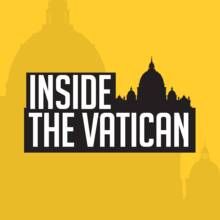Four members of the Synod on Synodality have tested positive for COVID-19 at the beginning of the second week of this unprecedented gathering, which includes representatives of various church ranks and experiences from around the world. But, while the Synod at the Vatican was preparing for a new week, violence rapidly escalated in the Middle East following a surprise attack by Hamas militants in Israel on Oct. 7."
“Let the attacks and weapons cease, please; because it must be understood that terrorism and war bring no solutions, but only the death and suffering of many innocent lives,” Pope Francis pleaded in his Sunday address, after praying the Angelus from the balcony above St. Peter’s Square. “Every war is a defeat. Let us pray for peace in Israel and Palestine.”
On this episode of 'Inside the Vatican,' Colleen and Gerry discuss the immediate responses from Pope Francis and senior church leaders to the attack, provide an overview of synod discussions—including the roles of women and young people in the church and the surging global migration crisis—and analyze the main speeches from the first week of the synod.
[Listen and subscribe to “Inside the Vatican” on Apple Podcasts and Spotify, for bi-weekly episodes during the month of the synod]
First, Gerry highlights the opening address by Jesuit Cardinal Jean-Claude Hollerich. As the chief rapporteur, Cardinal Hollerich plays a crucial role in framing the synod’s discussions and synthesizing various elements. “Francis has said time and time again, this is an ecclesial event, a spiritual event; it’s not a debating club, it’s not a discussion club, it’s not a parliament. We see this very clearly,” Gerry asserts. “Cardinal Hollerich says, ‘We are here to discern, but we can’t discern without praying.’”
Colleen then elaborates on Cardinal Hollerich’s call for intentional silence and prayer as she reflects on Pope Francis’ inaugural synod message. The pope, she notes, “spent a long time talking directly to members of the press, of the media, and also to the synod participants about how they should interact with the media,” encouraging each to “provide a communication that reflects this life in the Holy Spirit, that they’re trying to build within this Synod on Synodality.”
Colleen then quotes the pope’s words directly, stating that “this requires an asceticism, a certain fasting from public speech in order to ensure this.”
But, “what exactly that means in practice isn’t clear,” Colleen says, noticing that it has led to a range of interpretations among synod members.
“I come to think that the Pope’s insistence on privacy has given a lot of freedom to the participants to speak their minds,” Gerry remarks. Colleen agrees, adding, “Even in the first Synod session there were some disagreements about what synodality means, and that’s the kind of disagreement that Pope Francis wants people to be able to have.”
Links from the show
Hamas attacks
Pope Francis calls for end to conflict in Israel and Gaza: ‘Every war is a defeat’
In Jerusalem Cardinal Pizzaballa calls for international help to de-escalate after Hamas shock attack on Israel
Synod on Synodality
Can the Vatican control the synod narrative?
Synod Diary: What sets this synod apart? Prayer.
Analysis: The synod is not Vatican III. It’s Pope Francis’ implementation of Vatican II.
“Laudate Deum” — Apostolic exhortation on the climate crisis
Pope Francis delivers a message of despair in ‘Laudate Deum.’ We ignore it at our peril.
The Catholic Church thinks in centuries. But when it comes to climate change, Pope Francis doesn’t.







